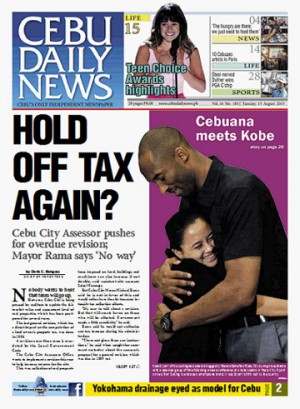Cebu City Assessor pushes for overdue revision; Mayor Rama says ‘No way’

However, Cebu City is being pressed by auditors to update the fair market value and assessment level of real properties which has been postponed for several years.
The last general revision, which has a direct impact on the computation of a land owner’s property tax, was done in 2006.
A revision every three years is mandated by the Local Government Code.
The Cebu City Assessors Office wants to implement a revision this year to help increase revenue for the city.
This way, collection of real property taxes imposed on land, buildings and machinery can also increase if not double, said assistant city assessor Leizel Gonzaga.
Article continues after this advertisementBut Cebu City Mayor Michael Rama said he is not in favor of this and would rather have the city treasurer intensify tax collection efforts.
Article continues after this advertisement“It’s easy to talk about a revision. But that will create havoc on those who will be affected. Government needs a little sensitivity,” he said.
Rama said he would not authorize any tax increase during his administration.
“I have not given them any instructions,” he said when sought for comment yesterday about the assessor’s proposal for a general revision, which was due in 2009 yet.
The mayor said the city should instead undertake a “revalidation” of real properties to check if properties in Cebu City are being used based on their actual tax declaration.
For example, with rapid urbanization, several residential properties are already converted to commercial use while its owners continue to pay taxes at a lower rate for a residential property.
“We recognize that (reassessment) is a source of income. But the most important is tax collection efficiency. We just have to collect the right amount of taxes,” he said.
Collection efficiency in Cebu City is 65 percent to 70 percent, according to Gonzaga.
She said the city government could collect about P700 million in real property taxes based on the assessed value of revalidated Cebu city private properties of P56.27 billion.
Tax mapping was done by the city assessors office from January to June to prepare for a general revision next year. The office inspected at least 20 properties per day and hopes to target 120,000 real property units (RPUs) per year.
They have so far identified 240,475 taxable real properties and 12,988 tax-exempt real properties with a total assessed value of P56.27 billion.
(Exempt properties are those owned by religious groups, the government and cooperatives.)
During a general revision, the fair market value (FMV) of property in different locations of the city is updated. This is an important base in computing real property tax which follows the formula: fair market value x assessment level x basic tax rate.
Gonzaga said the assessor’s office proposed in 2009 to implement a general revision of real properties in Cebu City but this was not acted upon.
This requires an endorsement from the mayor’s office to the City Council for the passage of an ordinance to implement a revision.
The pressure to update property figures comes from the 2012 annual audit report, where the Commission on Audit mentioned the need for Cebu City to adopt a general revision of real properties.
COA said non-compliance with section 219 of the Local Government Code has prevented the city from maximizing its power to raise revenues thus “preventing the City from earning additional income to be used for projects that could have benefited the general public.”
“We recommend that the City Assessor update the revised schedule of market values covering the different classes of real property for approval of the City Mayor,” auditors said.
It recommended for the City Assessor to endorse the updated fair market values (FMV) to the City Council to enact the appropriate ordinance.
It’s up to the mayor’s office and City Council to approve the recommendation, Gonzaga said.
Cebu City charges three percent basic tax on property.
One percent is set aside for the Special Education Fund to be spent for school buildings and teachers.
Of the remaining two percent, 70 percent will go to the City Hall coffers while the remaining 30 percent will go to the barangay where the property is located. /Doris C. Bongcac, Chief of Reporters